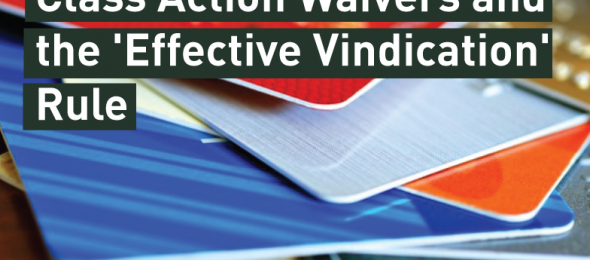Professor Linda S. Mullenix, Morris & Rita Atlas Chair in Advocacy at the University of Texas School of Law, has published a research paper entitled “Arbitrating Federal Antitrust Claims, Class Action Waivers, and the ‘Effective Vindication’ Rule,” Univ. of Texas Law, Public Law Research Paper No. 349. The paper is a preview of the issues before the United States Supreme Court in American Express Corp. v. Italian Colors Restaurant, et al. (No. 12-133). The appeal from the United States Court of Appeals for the Second Circuit addresses whether the Federal Arbitration Act permits a court to invalidate an arbitration agreement that does not permit class arbitration of a federal law claim. The case is currently set for oral argument on February 27, 2013.
Here is the abstract:
This article previews the issues and arguments in American Express Corp. v. Italian Colors Restaurant, et al., on the Court’s 2012-13 docket, to be argued February 27, 2013. The respondent retail merchants entered into agreements with petitioner American Express detailing how the respondents would accept Amex’s credit and charge cards. Respondents brought a Sherman Antitrust Act lawsuit against Amex, claiming that Amex used its monopoly power to force merchants to accept the agreement. Amex responded that the agreement requires arbitration, but prohibits classwide arbitration. The Court must now determine the effect in a federal Sherman Antitrust Act action of an arbitration clause that prohibits classwide arbitration, but where enforcement of the arbitration clause would effectively prevent the plaintiffs from vindicating their rights in the arbitral forum.
This appeal represents the third time in three years that the Supreme Court will consider the nature and scope of an arbitration agreement that contains a class action waiver — that is, a provision that does not permit an arbitration to be resolved on a classwide basis. In spite of this, the plaintiffs below (the respondents on appeal) contend that this case does not concern classwide arbitration at all, and that the classwide arbitration issue is a red herring.
The primary issue the Court will address is whether a federal court may invalidate an arbitration agreement that a defendant invokes to resolve a Sherman Antitrust Act claim when the arbitration agreement does not permit class arbitration, but where the litigant has shown that it would be unable to effectively vindicate its federal statutory rights to prosecute the antitrust claim in the arbitral forum?
Amex is significant because of the pervasiveness of arbitration provisions in modern commercial and consumer transactions, and the need for certainty in the interpretation and application of these provisions. Judicial reception to the use of arbitration as a means of alternative dispute resolution has shifted over time. Whereas courts once viewed such provisions with antipathy, courts now embrace the public policy doctrine favoring such private dispute resolution auspices. Nonetheless, this shift in appreciation for arbitration has occurred in a litigation landscape characterized by two-party disputes.
In the past decade, the emergence of classwide arbitration has taken contracting parties and the courts somewhat unaware. The prevalence of disputes over classwide arbitration, then, has exposed a challenging issue for ensuring certainty in dispute resolution. Moreover, fundamental public policy issues underlie the litigation over class action waivers in arbitration agreements. In addition, courts now recognize that the costs associated with certain types of complex litigation may effectively render arbitration impossible. The Court’s evolving arbitration jurisprudence has shaped corporate transactional behavior. Corporate defendants typically seek to insure against the unintended consequences of classwide arbitration by specifically prohibiting it through contractual language. However, as respondents point out, corporate defendants increasingly haveincluded more nuanced provisions in arbitration clauses to make arbitration more attractive to potential plaintiffs. These additional provisions include such measures as cost-shifting and payment of filing and arbitration fees. On the other hand, plaintiffs seek to ensure access to arbitral justice by invoking unconscionability doctrines or the effective vindication rule.
On a number of occasions now, the Court has tried to provide guidance for the construction and application of arbitration clauses that either are silent with regard to classwide arbitration or that contain class action waivers. In its most recent venture, the Court in Concepcion rather thoroughly canvassed all arguments in favor of and opposition to the enforcement of class action waivers, albeit on review of a state Supreme Court decision. The Amex appeal re-canvasses much the same arguments as in Concepcion, only the context of purported enforcement of federal antitrust statutes (rather than state law claims). It remains to be seen whether the different procedural posture makes a material difference for the Court’s appreciation of class action waivers, or whether this appeal causes the Court to further qualify its Randolph, Stolt-Nielsen, and Concepcion decisions.
In addition to the class action waiver dispute, this appeal also offers the Court the opportunity to clarify the effective vindication rule and address that it was mere dicta in Randolph or an important consideration in the enforceability of arbitration clauses. The Randolph decision sets forth the effective vindication rule, adopted by many federal courts, and this appeal offers the Court an opportunity to revisit the scope of this doctrine.
The full text of the paper is available for download from the Social Science Research Network, along with other articles written by Professor Mullenix.














